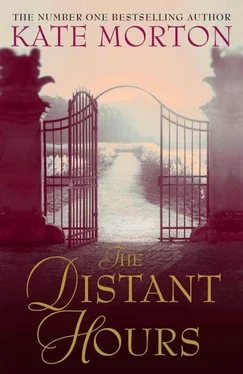Soon a second, similarly arranged pair came into view, then a third. Percy nodded a greeting to the latter then wished immediately that she hadn’t; the girl smiled back shyly and leaned into the boy’s arm and they exchanged a glance of such youthful tenderness that Percy’s own cheeks flushed and she knew at once her blundering intrusion. Blackberry Lane had been a favourite spot for courting couples even when she was a girl, no doubt long before that. Percy knew that better than most. Her own love affair had been conducted for years beneath the strictest veil of secrecy, not least because there was no chance that it might ever be validated by marriage.
There were simpler romantic choices she could have made, suitable men with whom she might have fallen in love, with whom she could have conducted a courtship openly and without risk of exposing her family to derision, but love was not wise, not in Percy’s experience: it was unmindful of social strictures, cared not for lines of class or propriety or plain good sense. And no matter that she prided herself on her pragmatism Percy had been no more able to resist its call when it came than to stop herself from drawing breath. Thus, she had submitted, resigning herself to a lifetime of layered glances, smuggled letters and rare, exquisite assignations.
Percy’s cheeks warmed as she walked; it was little wonder she felt such special affinity with these young lovers. She kept her head down thereafter, focused on the leaf-strewn ground, ignoring all further passersby until she emerged at the roadside, remounted, and began to coast down into the village. She wondered, as she rode, how it was possible that the great machine of war might be grinding its wheels when the world was still so beautiful, when birds were in the trees and flowers in the fields, when lovers’ hearts still heaved with love.
The first inkling that Meredith needed to wee came when they were still amongst the grey and sooty buildings of London. She pressed her legs together and shuffled her suitcase hard onto her lap, wondered where precisely they were going and how much longer they had to wait before they got there. She was sticky and tired; she’d already eaten her way through her entire packed lunch of marmalade sandwiches and wasn’t remotely hungry, but she was bored and uncertain and she was sure she remembered seeing Mum tuck a pound of chocolate digestive biscuits into the suitcase that morning. She opened the spring locks and lifted the lid a crack: peered inside the dark cavity then threaded her hands in so she could rummage about. She could have lifted the lid entirely, of course, but it was best not to alert Rita with any sudden movements.
There was the topcoat Mum had sat up nights finishing; further to the left a tin of Carnation milk Meredith was under strict instructions to present to her hosts on arrival; behind it, a half-dozen bulky terry towels Mum had insisted she bring, in a mortifying conversation that had made Meredith cringe with embarrassment. ‘There’s every chance you’ll become a woman while you’re away, Merry,’ her mum had said. ‘Rita will be there to help, but you need to be prepared.’ And Rita had grinned and Meredith had shuddered and wondered at the slim chance that she might prove a rare biological exception. She ran her fingers around her notebook’s smooth cover, then – Bingo! Beneath it she found the paper bag filled with biscuits. The chocolate had melted a little, but she managed to liberate one. Turned her back on Rita as she nibbled her way around the edges.
Behind her one of the boys had started singing a familiar rhyme -
‘Under the spreading chestnut tree,
Neville Chamberlain said to me:
If you want to get your gas mask free,
Join the blinking ARP!’
– and Meredith’s eyes dropped to her own gas mask. She stuffed the rest of the biscuit in her mouth and brushed crumbs from the top of the box. Stupid thing with its horrid rubbery smell, the ghastly ripping sensation as it pulled off her skin. Mum had made them promise they’d wear their masks while they were away, that they’d carry them always, and Meredith, Ed and Rita had all given grudging agreement. Meredith had later heard Mum confessing to Mrs Paul next door that she’d sooner die of a gas attack than bear the horrid feeling of suffocation beneath the mask, and Meredith planned to lose hers just as soon as she was able.
There were people waving to them now, standing in their small backyards watching as the train steamed past. Out of nowhere, Rita pinched her arm and Meredith squealed. ‘Why’d you do that?’ she asked, slapping her hand over the stinging spot and rubbing it fiercely.
‘All those nice people out there just lookin’ for a show.’ Rita jerked her head towards the window. ‘Be a sport now, Merry; give ’em a few sobs, eh?’
Eventually, the city disappeared behind them and green was everywhere. The train clattered along the railway line, slowing occasionally to pass through stations, but the signs had all been removed so there was no way of knowing where they were. Meredith must have slept for a time because the next she knew the train was screeching to a halt and she was jerked awake. There was nothing new to see, nothing but more green, clumps of trees on the horizon, occasional birds cutting across the clear blue sky. For one brief elated moment after they’d stopped, Meredith thought they might be turning around, going home already. That Germany had recognized that Britain was not to be trifled with after all, the war was over, and there was no longer any need for them to go away.
But it wasn’t to be. After another lengthy wait, during which Roy Stanley managed to vomit yet more tinned pineapple through the window, they were all ordered out of the carriage and told to stand in line. Everyone received an injection, their hair was checked for lice, then they were told to get back on board and sent on their way. There wasn’t even an opportunity to use a toilet.
The train was quiet for a while after that; even the babies were too worn out to cry. They travelled and they travelled, on and on, for what seemed like hours and Meredith began to wonder how big England was; when, if ever, they’d reach a cliff. And it occurred to her that perhaps the whole thing was really a great big conspiracy, that the train driver was a German, and it was all part of some devious plot to abscond with England’s children. There were problems with the theory, holes in its logic – what, for instance, could Hitler possibly want with thousands of new citizens who couldn’t be relied on not to wet their beds? – but by then Meredith was too tired, too thirsty, too utterly miserable, to fill them, so she squeezed her legs together even tighter and started counting fields instead. Fields and fields and fields, leading her to God knew what or where.
All houses have hearts; hearts that have loved, hearts that have billowed with contentment, hearts that have been broken. The heart at the centre of Milderhurst was larger than most and it beat more powerfully. It thumped and paused, raced and slowed, in the small room at the top of the tower. The room where Raymond Blythe’s many times greatgrandfather had sweated over sonnets for Queen Elizabeth; from which a great-aunt had escaped to sweet sojourn with Lord Byron; and upon whose brick ledge his mother’s shoe had caught as she leaped from the little archer’s window to meet her death in the sun-warmed moat below, her final poem fluttering behind her on a sheet of fine paper.
Standing at the great oak desk, Raymond loaded his pipe bowl with a fresh pinch of tobacco, then another. After his littlest brother Timothy died, his mother had retreated to the room, cloaked in the black singe of her own sorrow. He’d glimpsed her by the window when he was down at the grotto, or in the gardens, or on the edge of the woods, the dark shape of her small, neat head facing out towards the fields, the lake: the ivory profile, so like that on the brooch she wore, passed down from her mother before her, the French countess Raymond had never met. Sometimes he’d stayed outside all day, darting in and out of the hop vines, scaling the barn roof, in the hope that she would notice him, worry for him, shout him down. But she never did. It was always Nanny who called him in when the day was spent.
Читать дальше












